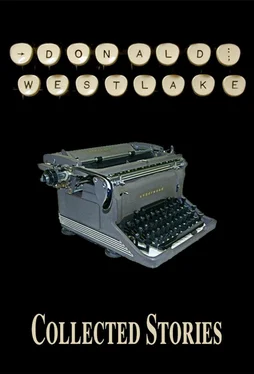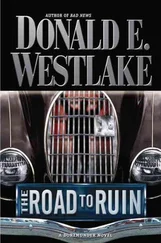Дональд Уэстлейк - Collected Stories
Здесь есть возможность читать онлайн «Дональд Уэстлейк - Collected Stories» весь текст электронной книги совершенно бесплатно (целиком полную версию без сокращений). В некоторых случаях можно слушать аудио, скачать через торрент в формате fb2 и присутствует краткое содержание. Год выпуска: 2020, Издательство: Jerry eBooks, Жанр: Фантастика и фэнтези, Детектив, short_story, на английском языке. Описание произведения, (предисловие) а так же отзывы посетителей доступны на портале библиотеки ЛибКат.
- Название:Collected Stories
- Автор:
- Издательство:Jerry eBooks
- Жанр:
- Год:2020
- ISBN:нет данных
- Рейтинг книги:5 / 5. Голосов: 1
-
Избранное:Добавить в избранное
- Отзывы:
-
Ваша оценка:
- 100
- 1
- 2
- 3
- 4
- 5
Collected Stories: краткое содержание, описание и аннотация
Предлагаем к чтению аннотацию, описание, краткое содержание или предисловие (зависит от того, что написал сам автор книги «Collected Stories»). Если вы не нашли необходимую информацию о книге — напишите в комментариях, мы постараемся отыскать её.
Collected Stories — читать онлайн бесплатно полную книгу (весь текст) целиком
Ниже представлен текст книги, разбитый по страницам. Система сохранения места последней прочитанной страницы, позволяет с удобством читать онлайн бесплатно книгу «Collected Stories», без необходимости каждый раз заново искать на чём Вы остановились. Поставьте закладку, и сможете в любой момент перейти на страницу, на которой закончили чтение.
Интервал:
Закладка:
It was the first wall in their experience that had ever defended itself. One of the men raised a heavy axe above his head and crashed the edge of it into the wall. Before he knew what was going on, the axe was going back the way it had come, was bringing him with it, and driving him all the way across the hall — until the axe hit the opposite wall and bounded off to one side. Then the man hit the wall and bounded off to the other side.
Somebody else slammed the wall at the same time with a sledge hammer. Before he could take it up with the union, the hammer had rebounded, sped through his spread legs, and had jackknifed him down and through after it.
It was the same thing everywhere. Axes and hammers of all kinds were bouncing off the walls, as though someone were trying to break a steel girder with a tennis ball. After about an hour of unrewarding effort, the walls didn’t have a mark on them. They were still there — and that was something which had never happened in the entire two-hundred-and-six year history of the Smith Wrecking and Salvage Company.
The company was irked, and rightfully so. Their men, their most experienced hands, were threatening angrily to quit; and their reputation was flying away on the wings of Mercury — or fluorine, rather. So they went before the City Council, which was holding its sessions in the one local theater, the Paramount, and asked just what the City Fathers meant to do about this.
The City Fathers hadn’t the slightest idea, and said so. They pointed out to the Smith Wrecking and Salvage Company that it was their job to tear buildings down and not in the sphere of business of the City Council. They also suggested that the Smith Wrecking and Salvage Company get to work pretty damn fast, and get that building down, because they had already engaged the contractor to begin building the new City Hall on the same site come June, which was only two months away.
The representatives of the company left the Paramount Theatre figuratively tearing their hair, but more determined than ever that the City Hall, indestructible or not, was going to be torn down if it took every man and every penny the Smith Wrecking and Salvage Company could scrape together to do it. There’s such a thing as honor, you know.
Experts were called in, and they muddled around for a while, looking at the walls of the City Hall through magnifying glasses; inspecting samples of fluoryl plastics under microscopes; and muttering through their Van Dykes. They finally decided that there wasn’t a way in the world to tear that building down. They said as much, pocketed their pay, and left.
The Smith Wrecking and Salvage Company obstinately refused to take their experts’ word for it. In their long experience with knocking things apart, not once had they come across anything that couldn’t be knocked; and this blasted City Hall wasn’t going to be the exception. Not while the Smith Wrecking and Salvage Company was out of the hands of the receivers was this going to be an exception.
They bought some Army surplus flame throwers, hired more men, and went to work spurting flame all over everything. The walls stood there and ignored the whole thing. For three solid days and nights, working their men in eight-hour shifts the clock around, they sprayed the walls with consuming flame. But the flame, unfortunately, didn’t consume a thing. It hadn’t, by the end of these three days, scorched the walls; it hadn’t done a thing to the walls. As far as the walls were concerned, the Smith Wrecking and Salvage Company might have been throwing feathers at them instead of flame.
The company gave up and sold the flame throwers to somebody for about a third of what they’d paid for them. Then they sat back, took a deep breath, and looked at those walls with hate in their eyes.
By this time, the affair had hit the wire services and the whole world was watching the process, hands cupped politely over mouths. This one was a scream. An independent motion picture producer tried to get permission to make a documentary movie based on the struggle, using it symbolically — man against the machines he has created. A national beer company tried to get the next onslaught put on coast-to-coast television, with said beer company sponsoring, naturally. Both the City Council and the Smith Wrecking and Salvage Company turned all such offers down vituperously and often. They were beginning to feel like peacocks with their tail feathers clipped.
Next, they tried acid. They took the most destructive acids they knew — and a few acids that nobody was sure about yet — and sprayed the walls, drenched the walls, covered the walls with reeking layers of these things; they tried the acids one after the other, and later in combination.
The walls just stood there and shrugged the whole thing off. They didn’t even shrug, really; they just stayed stolidly silent and indestructible. It was enough to give a man an inferiority complex, a persecution mania, and high blood pressure.
That’s the effect violence had on the City Hall of Lewiston, Massachusetts: No effect at all.
The wrecking company was in such a reasonless rage that it went to the extent of suggesting an atomic bomb, but the city fathers clamped down on that idea for the double reason that the resultant radioactivity from an atomic blast would make the whole town uninhabitable for some time — and it probably wouldn’t do any good, anyway.
When the representative of the Smith Wrecking and Salvage Company was told this, in no uncertain terms, he became thoroughly incensed. “All right,” he agreed, “no atomic bomb; but how about an ordinary bomb? How about a few sticks of dynamite placed here and there in the building? We’d clear everyone in a three block radius of the building out of the way for a while and just let her rip. If that doesn’t do it, nothing will, and I suggest that you gentlemen might just as well go back to your old City Hall and forget about a new one.” So said the representative of the Smith Wrecking and Salvage Company.
The City Council thought about it for a while and finally decided it couldn’t do any harm; it would have the advantage of getting the Smith Wrecking and Salvage Company out of everyone’s hair, so they said, all right, go ahead and do it.
It took eight days to gather the paraphernalia and get ready for the last decisive siege. Workmen carrying boxes of dynamite trudged endlessly into the City Hall and returned empty-handed for more. The Smith Wrecking and Salvage Company had affixed its good name to a document, guaranteeing reparation for any and all damage done to any property other than the City Hall proper. Everyone in a three block radius was moved to a safe distance. The wreckers were ready to try the last desperate attempt to destroy the Lewiston City Hall.
Reporters, photographers, newsreel cameramen and tourists crammed the town, pouring huge sums of money into the local coffers and cash registers. The town was very happy about the whole thing and the tourists and the newsmen were happy, too. The only ones who weren’t happy were the Smith Wrecking and Salvage Company and the City Council of Lewiston, Massachusetts.
Probably the happiest people of all were the owners of Peabody’s Plastic Products, maker of the fluoryl plastic which formed the City Hall. While other manufacturers had to talk about laboratory tests in their advertising, Peabody’s Plastic Products had simply to point with pride to the resplendently white Lewiston City Hall, standing serene and unscarred after weeks of the most harrowing treatment — treatment that would have reduced any other building to rubble in hours. Peabody’s Plastic Products looked upon the proposed demolition with nonchalance and confidence. They even had a man with a small movie camera recording the occurrence, for future television commercials.
Читать дальшеИнтервал:
Закладка:
Похожие книги на «Collected Stories»
Представляем Вашему вниманию похожие книги на «Collected Stories» списком для выбора. Мы отобрали схожую по названию и смыслу литературу в надежде предоставить читателям больше вариантов отыскать новые, интересные, ещё непрочитанные произведения.
Обсуждение, отзывы о книге «Collected Stories» и просто собственные мнения читателей. Оставьте ваши комментарии, напишите, что Вы думаете о произведении, его смысле или главных героях. Укажите что конкретно понравилось, а что нет, и почему Вы так считаете.








